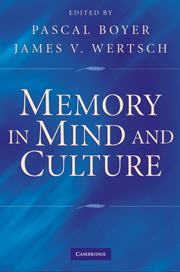Book contents
- Frontmatter
- Contents
- List of Contributors
- PART I IN MIND, CULTURE, AND HISTORY: A SPECIAL PERSPECTIVE
- PART II HOW DO MEMORIES CONSTRUCT OUR PAST?
- PART III HOW DO WE BUILD SHARED COLLECTIVE MEMORIES?
- 5 Collective Memory
- 6 The Role of Repeated Retrieval in Shaping Collective Memory
- 7 Making History: Social and Psychological Processes Underlying Collective Memory
- 8 How Does Collective Memory Create a Sense of the Collective?
- PART IV HOW DOES MEMORY SHAPE HISTORY?
- PART V HOW DOES MEMORY SHAPE CULTURE?
- Index
- References
6 - The Role of Repeated Retrieval in Shaping Collective Memory
Published online by Cambridge University Press: 05 June 2012
- Frontmatter
- Contents
- List of Contributors
- PART I IN MIND, CULTURE, AND HISTORY: A SPECIAL PERSPECTIVE
- PART II HOW DO MEMORIES CONSTRUCT OUR PAST?
- PART III HOW DO WE BUILD SHARED COLLECTIVE MEMORIES?
- 5 Collective Memory
- 6 The Role of Repeated Retrieval in Shaping Collective Memory
- 7 Making History: Social and Psychological Processes Underlying Collective Memory
- 8 How Does Collective Memory Create a Sense of the Collective?
- PART IV HOW DOES MEMORY SHAPE HISTORY?
- PART V HOW DOES MEMORY SHAPE CULTURE?
- Index
- References
Summary
This book is about culture and memory, about how the society and culture in which people grow up helps to determine their individual memories, collective memories, and identity. We will emphasize how the process of repeated retrieval helps to shape our memories. Before we get to our main story, we need to provide some background.
Many different cultures exist within the community of scholars who study memory, from humanistic approaches to a whole variety of scientific approaches to the field (see Roediger, Dudai & Fitzpatrick, 2007). In our chapter, we attempt to blend some insights from several approaches to studying memory. In particular, we apply the principles that have emerged from research in experimental cognitive psychology to issues in collective memory in hopes that combining insights from various disciplines may point the way to progress in understanding larger issues in the study of memory.
Our chapter has six parts. First, we discuss issues in collective memory – how we conceive the topic – by considering three conceptual oppositions (following Wertsch & Roediger, 2008). We then discuss how these issues might play out in learning about history from textbooks. Next, we describe three main mechanisms that we believe play a critical role in shaping collective memory: the act of retrieving information from memory; repeated retrieval of information over long periods of time; and finally the role of feedback in modifying memories.
Information
- Type
- Chapter
- Information
- Memory in Mind and Culture , pp. 138 - 170Publisher: Cambridge University PressPrint publication year: 2009
References
Accessibility standard: Unknown
Why this information is here
This section outlines the accessibility features of this content - including support for screen readers, full keyboard navigation and high-contrast display options. This may not be relevant for you.Accessibility Information
- 32
- Cited by
